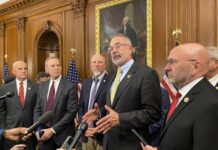
(Georgia Recorder) — Dallas Republican Sen. Jason Anavitarte’s Senate Bill 351 would require social media platforms like Facebook, X, Instagram, and TikTok to verify users’ ages. Children under 16 would need parental permission to create an account, and the platforms would be limited in how they collect data from minor users. It also calls on state and local boards of education to develop programs on topics like internet safety and cyberbullying.
The Senate Committee on Education and Youth approved it unanimously.
A recent consensus study by the National Academies of Science “did not support the conclusion that social media causes changes in adolescent health at the population level,” but did find that some features of social media can harm some young people’s mental health.
“These include, but are not limited to, algorithmically driven distortions of reality exacerbating harmful content and disinformation, the distraction away from time that can otherwise be used in more healthy ways, and the creation of opportunities where youth can be abused or exploited,” the study reads.

The study noted that not all young social media users will be affected in these ways and some young people are helped by social media. The NAS researchers’ recommendations include “to develop industry standards that can ensure social media use protects mental health in the long term, the engagement of educators and health care providers in highlighting the benefits, and minimizing the harms of social media use, and specific measures to protect youth from online abuse.”
Mike Griffin, a lobbyist with the Georgia Baptist Mission Board, said he hopes the proposed law will help protect Georgia children from abusers by making parents take a closer look at their kids’ online activities.
“I’m very concerned about the sexualization of our children in our culture today. I believe this bill helps address some of that to make sure their parents are doing a better job of supervising our children,” he said.
As social networks have become more and more necessary to participate in business and culture, lawmakers at the state and federal levels have sought to guide their influence on society, especially on children.
States, including Arkansas and Utah, have passed laws similar to Georgia’s proposal. Social media companies are pushing instead for federal legislation that would put the onus on app stores to verify ages and require parental approval whenever a child under 16 downloads an app, arguing that would allow parents to oversee their kids’ online activity from one place rather than having to approve each separate platform their kid wants to sign up for.
Late last month, U.S. Senators grilled social media executives in a four-hour hearing on protecting children from ills they said were caused by their products.
In a tense exchange with Meta CEO Mark Zuckerberg, U.S. Sen. Jon Ossoff of Georgia said social media companies have a financial incentive to keep kids on their platforms.
“And that is where public policy has to step in, to make sure that these platforms are safe for kids, so kids are not dying, so kids are not overdosing, so kids are not cutting themselves or killing themselves because they’re spending all day scrolling instead of playing outside,” Ossoff said.







